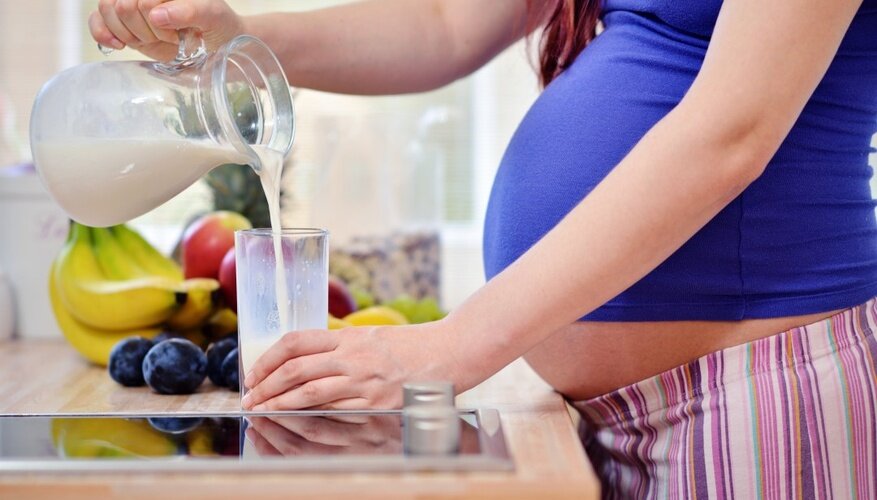9 Superfoods For 9 Super Months
Can you list all of the nutrients you should be getting in your daily pregnancy diet? It's okay - this isn't a quiz - and we don't expect you to know. The truth is, if you're taking a prenatal vitamin and eating a balanced diet (with extra emphasis on the fruit and veg), you are probably getting all of the nutrients you need. If you want to boost your nutrient intake, it's best to do it naturally through food, rather than supplements - and that's why we're here.
We've compiled a list of the top 9 superfoods for 9 months of pregnancy, and every single one packs a massive nutrient punch.
Superfoods you’ll love for the 9 months of pregnancy
1. Whole grain cereals - These are cereals that haven't been over-processed or broken down, meaning they still retain their bran and germ. A simple test: on the nutritional label look at total carbohydrates and fiber content. If the relationship is greater than 10:1, it's likely the cereal has been over-processed and lost much of its nutrient-filled components.
Here's what you'll get: Folate, Calcium, Vitamin D, Iron, Riboflavin, Zinc, Vitamin B12, Manganese, Magnesium, and Thiamin
2. Spinach - Popeye sure liked it and we do too. You won't develop bulging biceps by upping your spinach intake, but you will boost your consumption of essential pregnancy nutrients. Plus - it is an amazing source of fibre. Always get fresh spinach, and remember - you get the most out of it when it's eaten raw.
Here's what you'll get: Iron, Folate, Vitamin A, Thiamin, Potassium, Magnesium, and Calcium
3. Mixed nuts and seeds - They are filled with healthy fats and fibre. Cashews, pecans, sunflower seeds, walnuts, pumpkin seeds, hazelnuts, macadamia nuts - you name it. Also, studies show that women who eat nuts during pregnancy have children with a lower risk of developing a nut allergy.
Here's what you'll get: Folate, Copper, Magnesium, Chromium, Omega-3 Fatty Acids, Thiamine, Riboflavin, Iron, Phosphorous, Zinc, Manganese, Calcium, and Potassium
4. Legumes - This includes beans, peas and lentils. It's a broad category and incredibly versatile, so mix and match and add some legumes to your daily meals. They're low-fat, cholesterol-free and so good for you and baby.
Here's what you'll get: Folate, Iron, Magnesium, Potassium, Zinc, Iodine, Copper, and Phosphorous
5. Oranges - The juice is fantastic for you too, but opt for natural, no-sugar added selections. Even better is fresh-squeezed OJ! These fruits are the quintessential snack for summer and they are gems when it comes to nutritional value.
Here's what you'll get: Folate, Calcium, Vitamin C, Potassium, Vitamin D, Magnesium, Copper, Vitamin B6, and Thiamin
6. Hard-boiled eggs - You'll want to avoid raw or undercooked eggs during pregnancy. So, to be on the safe side, hard-boil them and always make sure they are fresh. It doesn't matter if you choose duck, chicken or quail eggs - they are jam-packed with nutrients.
Here's what you'll get: Vitamin D, Choline, DHA, Pantothenic Acid, Riboflavin, Vitamin B6, Vitamin B12, Iron, Copper, and Zinc
7. Salmon - Don't be afraid of this fish during pregnancy. If you can, choose wild Pacific salmon varieties and be sure to cook fully. Add this oily fish to your diet once a week and you'll get a whole host of wonderful vitamins and minerals.
Here's what you'll get: Omega-3 fatty acids, Calcium, Vitamin D, Choline, DHA, Phosphorous, Vitamin B12, and Potassium
8. Yogurt - Go Greek! Greek yogurts have around 2 times as much protein and typically less sugar as compared to regular yogurts. Plus, they are lush with probiotics, which help to promote growth of good gut bacteria and restrict growth of bad bacteria. Take care to avoid any non-pasteurized options.
Here's what you'll get: Calcium, Vitamin C, Potassium, Riboflavin, Zinc, and Iodine
9. Sweet potatoes - Leave the skin on! The healthiest cooking method - to retain the most amount of nutrients and reduce reduce excess use of fats - is to steam your sweet potatoes. However, baking and boiling are also good options. They are full of carotenoids that your body converts to Vitamin A. You may be wary of Vitamin A but there is no need to be when it comes from plant sources - as it is completely safe and a crucial vitamin for your baby's visual development!
Here's what you'll get: Vitamin A, Vitamin C, Iron, Thiamin, Riboflavin, Vitamin B6, Pantothenic Acid, Potassium, Copper, and Manganese
BONUS: Milk - We'll call it a super-drink. Make sure it's pasteurized, and don't be afraid of whole milk! Drinking whole milk will increase your fat intake, but a glass or two a week combined with regular exercise will give you loads of the key nutrients you (and your baby) need during pregnancy - so drink up!
Here's what you get: Calcium, Vitamin D, Iodine, Riboflavin, Pantothenic Acid, Phosphorous, and Vitamin B12











